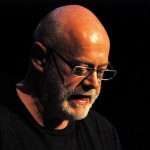Three Poems
Line Please
A line is: a) a sick circle b) an unfolded word c) an aggressive dot
d) what you want to erase e) what you regret after you dish it out.
—Yoko Ono, ‘Line Talk’
An aggressive dot stuttering now into morse,
now to Death’s autograph on ECG monitors,
the point of this pen ploughing on from birth
to its boring verse-end half-rhyme of death.
What you regret. Inuit rage to Yoruba culture,
lines in land, flesh self-harmed into sculpture;
the trails left by my Oulipian rats in their maze
unravelling like a lie. What you want to erase:
those crumpled white sheets as if Cozens’ ink
fell like black sunlight on a page I’d wish blank,
its landscape folding under geological strain,
an unfolded word unfolding again and again,
my sick circle of mistakes on their Möbius strip,
the repressed returning to read from its script,
my own spirit hesitating on a spiral stairway,
too late for all time with the right thing to say.
Jerusalem
A printmaker is a most peculiar being who takes
pleasure in working backwards or in opposites…
left is right, right is left, backwards is forwards—
Heller’s ‘Printmaking Today’ had us both in fits.
On Albion’s fall into selfhood, Blake’s Jerusalem
came down from heaven as a city and a woman;
I bent over her designs for our new commission,
blind as Blake’s Newton to all but my compass.
She showed me a needle but I saw Newton’s
pushing into his eye, unweaving his rainbow.
Opening mine again, its lid rolled up to the sky
like a window blind onto a summer’s morning.
The White Page
Poets don’t draw. They unravel their handwriting and then tie it up again, but differently.
-Jean Cocteau
If you stretch out this writing
into one long, thin single line,
draw it to an invisible thread,
you can make its information
your own material, giving you
the whip-hand over this verse,
this universe, then with a flick
of your wrist, it will ripple into
a silhouette of your own fancy,
a portrait of Widow Wadman
left blank in ‘Tristram Shandy’
by Sterne for your realisation,
like Botticelli’s last white page
for the Virgin in his sequence
illustrating Dante’s ‘Paradiso’,
but even more like Cixous’ ink
or letters Molly Bloom sends
herself, love’s blind signature.
Read An Interview with Ian Duhig on our blog.










